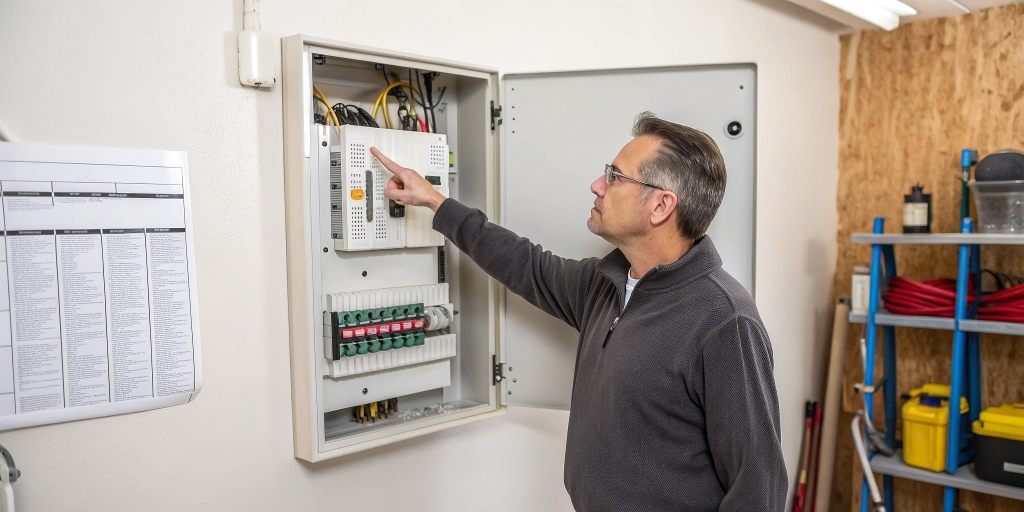Electrical Panel Basics
Your home’s electrical panel, also referred to as the breaker box or distribution board, is the central hub for all electrical circuits in your house. Its primary function is to safely distribute electricity from the utility service line into your home, efficiently channeling power to different rooms, appliances, and electrical outlets. Acting as the gatekeeper of your home’s electrical supply, it allows for control, isolation, and protection of each circuit, helping to prevent potential hazards such as fires or electrical shocks.
If you ever encounter recurring issues, unusual noises, or if your panel feels warm to the touch, it is crucial to act quickly and seek help from a certified residential electrician. Professionals have the expertise to address faults or recommend upgrades, safeguarding your home and loved ones from avoidable risks.
Regular inspections and routine maintenance—like checking for loose wires, corrosion, or unclear circuit labeling—can prevent unexpected power outages and expensive repairs down the road. With the rise in home technology and increasing energy demands, understanding your panel means you’re ready to accommodate new appliances or smart devices without overloading your system.
Key Components of an Electrical Panel
The main breaker is a large switch that controls the entire electrical system in a home. It is crucial for safe repairs or emergencies. Below it are smaller circuit breakers dedicated to a specific area or appliance. When a circuit breaker detects excess current or a short circuit, it “trips,” disconnecting it from the electrical supply. All of these functions as part of a broader electrical wiring system, which distributes power safely and efficiently throughout the home. Bus bars, thick metal strips, act as highways for electrical current, distributing power from the main breaker to each circuit breaker. Neutral and ground bars provide safety functions, closing loops and channeling stray currents into the ground. Good grounding is essential for safety.
Recognizing Signs of Panel Issues
For the most part, electrical panels operate quietly and reliably. Nonetheless, they are not immune to wear, age, or the impact of high demand. Regular visual checks—simply opening the panel door and scanning for abnormalities—can reveal issues long before they become emergencies.
- Frequent Tripping: If the same breaker trips every few days or weeks, it’s a red flag. This could mean that one area of your home is pulling more power than the circuit can safely handle, or there’s a deeper issue like deteriorating wiring or malfunctioning appliances. Do not ignore repeated tripping, as it puts additional stress on both the wiring and the breaker itself.
- Visible Damage: The presence of rust, scorch marks, melted insulation, or corroded components inside your panel is a clear signal that moisture, heat, or age are compromising your electrical safety. Any form of visible damage warrants immediate inspection by an electrician. These symptoms can indicate risks such as arcing, where electricity jumps gaps and could spark a fire.
- Unusual Noises: Any buzzing, crackling, or popping sounds from the panel suggest loose connections, arcing, or other internal faults. Electrical systems should operate silently; any odd noises coming from your panel are cause for serious concern.
Taking immediate action when you notice these warning signs is crucial to prevent electric shocks or house fires and avoid putting your family at risk.
When to Consider an Upgrade
Today’s households frequently demand more electricity than older systems were designed to provide. Advancements like smart home technology, home offices filled with electronics, and luxury appliances all strain outdated systems. If you’re experiencing constant breaker trips, extension cords running everywhere, or your panel is warm to the touch, it may be time for an upgrade.
- Your home is over 25 years old, and the panel has never been replaced. As panels age, components can degrade, and older panels may not have modern safety features like arc-fault or ground-fault protection.
- Planned renovations or expansions—such as finishing a basement, adding rooms, or converting a garage to living space—that will require additional circuits or greater power capacity.
- Adding major appliances, electric vehicles, or whole-home generators that will significantly increase the electrical load on your existing system.
Upgrading your panel can boost home value, improve safety, and allow seamless integration of new technologies. In some cases, insurance companies may refuse coverage or charge higher premiums for homes with outdated or unsafe panels—such as those manufactured by certain companies known for product recalls.
Safety Precautions for Homeowners
No matter how minor it seems, any work involving electricity is inherently risky. Always make safety your top priority.
- Ensure that the area in front of your breaker box is always dry and free from clutter, such as boxes or cleaning supplies, so that you can quickly access it in an emergency.
- Never remove the cover from the panel or attempt repairs unless you thoroughly understand electrical systems and use insulated tools and personal protective equipment.
- Test Ground Fault Circuit Interrupters (GFCIs) monthly and check that all outlets near water sources have functioning protection. If a GFCI or breaker doesn’t trip during a test or won’t reset, don’t attempt further troubleshooting yourself.
Using “cheater” plugs, makeshift wiring, or trying to force stuck breakers can turn small maintenance tasks into life-threatening hazards. When in doubt, call a licensed professional.
Consulting a Professional
Electrical codes and safety standards evolve, and working with a skilled electrician ensures repairs and upgrades comply with state and local regulations. Attempting major panel work could result in costly mistakes or endanger your home insurance coverage. Licensed professionals can diagnose hidden dangers, recommend the right panel size for your needs, and guarantee work will pass inspection.


